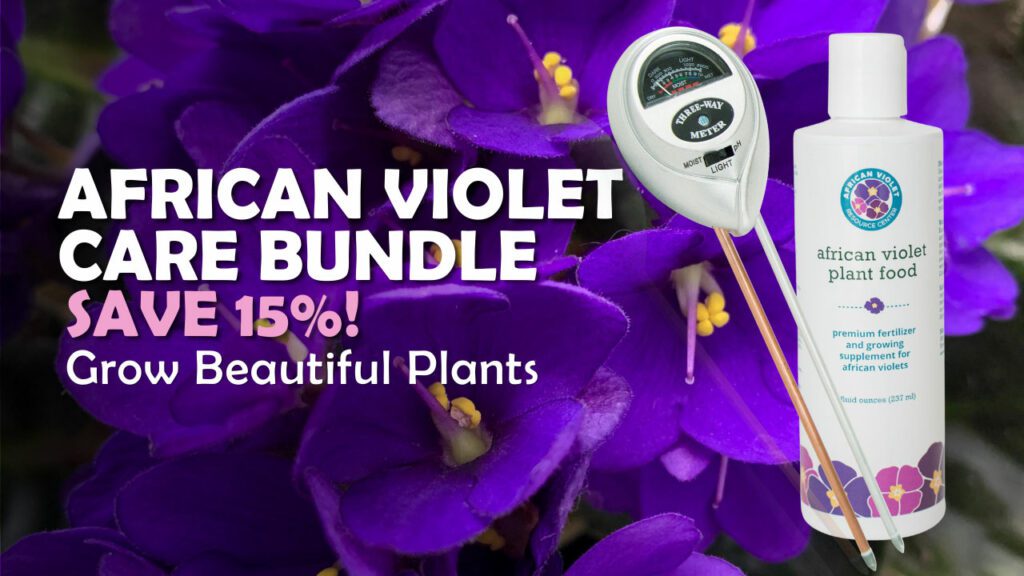Everything You Need to Know About Feeding Your African Violet
Fertilizer is an essential part of keeping houseplants happy—and that includes your dainty African violet. Sometimes new growers don’t fully understand the importance of a balanced diet. This leaves them scratching their heads besides lackluster plants. But developing a feeding routine can feel daunting; what’s the best type of fertilizer? What does plant food even do?
This novice-friendly guide to African violet fertilizer will get you up to speed with what it takes to grow a healthy, hearty houseplant. Let’s jump in!
Why Do Plants Need Fertilizer?
Like humans, plants convert nutrients into energy to function. But instead of chewing their lunch, they absorb it. Using their roots, plants soak up nutrients in the soil. In nature, decaying organic matter replenishes these nutrients as surrounding plant life depletes them.
Indoor plants, however, need a little helping hand. Because they grow in limited soil, and there’s no decaying matter to complete the cycle, they eventually use up all of the nutrients available. That’s where fertilizer comes in.
Fertilizer replenishes the nutrients plants use to grow. Total depletion is a slow process; plants can survive for quite some time without a soil refresh. But surviving isn’t thriving, and with flowering plants like the African violet, that usually means no beautiful blooms. That’s because it takes a lot of energy to put on a colorful show. Imagine running a marathon on an empty stomach and no sleep—you might not be up to the challenge. Same with your plant.
The Big Three
There’s a reason you can’t survive on pizza rolls alone. They don’t contain all of the nutrients you need to function. (Shoot!) Your plant needs a balanced diet too. That’s why most commercial fertilizers contain three primary elements: nitrogen, phosphorus, and potassium. Each plays a fundamental role in powering your houseplant.
1. Nitrogen
Plants absorb more nitrogen than any other nutrient. Nitrogen fuels new growth and is essential for plant health. If your African violet leaves are stunted or turning a pale yellow color, they may be nitrogen deficient.
2. Phosphorus
Plants need phosphorus to transfer and store energy. This nutrient also aids in photosynthesis. If your plant is getting all the right care but still won’t bloom, it might need a phosphorus boost.
3. Potassium
Potassium strengthens and fortifies plants, which helps them resist disease and grow strong root systems. African violets low on potassium can have leaves that yellow and turn brown at the tips.
Demystifying Fertilizer Options
Now that you know why you need fertilizer, let’s talk about how to pick one that works for you. There are about as many fertilizer options as there are species of plants. (Okay, that might be an exaggeration, but there’s A LOT!) Figuring out what’s best for your plant can make a newbie’s head spin, but it’s pretty easy once you get the hang of it.
Synthetic vs. Organic
First, you’ll decide whether you’ll use fertilizer made from man-made or organic materials. Organic materials like manure, fish, and seaweed return nutrients to the soil the same way as in nature, through decay. Although this slightly stinky option is less common for indoor houseplants, you can make homemade African violet fertilizer or buy a natural product at the store.
Synthetic fertilizers are chemically formulated for a specific balance of the big three. Synthetic fertilizer is more popular indoors for two reasons: it’s generally odorless, and you can control the dosage, which is important in small containers. We recommend looking for a species-specific product. This lets you rest easy knowing your fertilizer was made with your plant’s needs in mind.
Buy African Violet Fertilizer online here.
Liquid vs. Slow Release
Fertilizer comes in liquid or solid form. The two most popular types of African violet fertilizer are concentrated liquids and soluble powder. Both are mixed into your plant’s water, delivering a nutrient boost as it takes up water through its roots. Since bottom-watering is common with African violets, this is an effective way to hydrate and feed your plant at the same time.
You may also encounter granular or tablet-form fertilizer as you start your search; these are better suited for outdoor plants. These concentrated, extended-release methods can be too harsh for houseplants growing in limited soil.
So, What Is the Best Fertilizer for African Violets?
Although African violets are easy to please, they can be extremely delicate. When it comes to fertilizer, your biggest risks are burning your plant’s sensitive roots or shocking its system with too much at once. That’s why we recommend always using a gentle, African violet-specific product.
Look for African violet fertilizer that is:
- African violet-specific
- 100% water-soluble
- Urea-free
Why African Violet-Specific?
Different plants need different levels of the big three (nitrogen, potassium, and phosphorus). Fertilizer made specifically for African violets is made with their preferred balance in mind. This is particularly important with such a sensitive plant.
Why Urea-Free?
We recommend avoiding products that contain urea, a synthetic chemical widely used in fertilizers to replenish nitrogen. Because of its extremely high nitrogen levels, urea can be detrimental to delicate African violets growing in limited soil.
Why 100% Water-Soluble?
Mixing plant food into water is a common and efficient method. It’s important, however, to make sure you choose a product that is 100% water-soluble. This ensures that all of the essential nutrients in the fertilizer dissolve and are accessible to your plant.
When Should I Fertilize My African Violet?
There are two routes you can take: fertilize your plant at regular intervals, or every time you water. With the former, the rule of thumb is to fertilize during the growing season. Follow the product instructions (you’ll usually apply between every four to six weeks) and stay on schedule! Sporadic feedings can stress out your plant.
You can also opt for a more continuous option. Adding a gentle liquid plant food every time you water or change the reservoir provides a gentle, steady dose of energy to your plant. Plus, it’s one less thing to keep track of on your calendar.
Our liquid African violet fertilizer is urea-free, 100% water-soluble, and gentle enough to use at every watering.
Houseplant Pro Tip: There is some debate about whether African violets should be fertilized in the winter since, technically, their growing season can last all year. Both camps produce healthy plants, so it’s really up to you.
What’s YOUR African violet fertilizer routine? Tell us about your favorite methods below!
Join the African Violet Club!
Whether you’re just starting out or are a seasoned grower, African Violet Resource Center has everything you need to help your plant grow vibrant and strong. Explore our other articles, visit our online shop, and connect with other houseplant lovers in our Facebook group to learn everything you need to know about this rewarding hobby!
More Great African Violet Resources
Stayin’ Alive! A Beginner’s Guide to African Violet Care
Everything You Need to Know About African Violet Leaves





